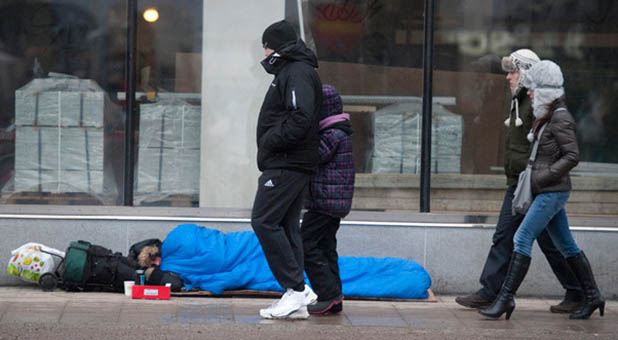As temperatures plummeted last week, many churches and religious organizations reached out a helping hand to the homeless, but how many of them—likely unknowingly—were breaking government rules or regulations by doing so?
For those who are homeless, finding a warm place to shelter in the winter is a matter of survival, but some charitable efforts to provide shelter and food to them may be hampered by local government regulations that restrict or prohibit providing services to those in need. With many cities targeting the homeless for harassment, prosecution and forced relocation in an effort known as “gentrification,” many churches and religious organizations are also finding themselves in the crosshairs.
Having defended the right of churches and other charitable institutions to provide shelter and food to the homeless and needy, the Rutherford Institute offers a “constitutional Q&A” titled Helping the Homeless to aid those who might encounter opposition from local government agencies. Click here to access the primer.
As part of their guidelines, Rutherford Institute attorneys have cited real-life incidents from years past. In one instance, the 90-year-old founder of a Florida nonprofit that feeds the homeless faced a fine of $1,000 and up to four months in jail for violating a city ordinance that makes it a crime to feed the homeless in public.
Here are some other examples:
- a church that allowed a homeless woman to stay in a trailer on its own property was cited for maintaining a campground without a permit,
- a church that allowed homeless persons to sleep on the church lawn was charged with improperly maintaining a boarding house and
- a collection of churches that took turns providing the homeless shelter within the churches during the winter months were told they needed a permit to do so.
As the Rutherford Institute’s guidelines point out, in addition to the protections afforded by the First Amendment, the constitutions of each state also protect the right to free exercise of religion. In some instances, the protection provided by a state constitution may be greater than that provided by the First Amendment and may limit the authority of local officials to restrict religious-based care toward the homeless and needy.
Additionally, a federal law called the Religious Land Use and Institutionalized Persons Act provides additional protection to churches respecting the use of their land for religious purposes.
“Churches and other religious institutions have a spiritual mandate to care for the needy and downtrodden, and should be supported—not hindered—in their efforts to do so,” Rutherford Institute President John W. Whitehead said. “With government budgets currently stressed beyond capacity, any organization, church or otherwise, that wants to provide shelter for the homeless in their community should be welcomed with open arms.” {eoa}
See an error in this article?
To contact us or to submit an article






















